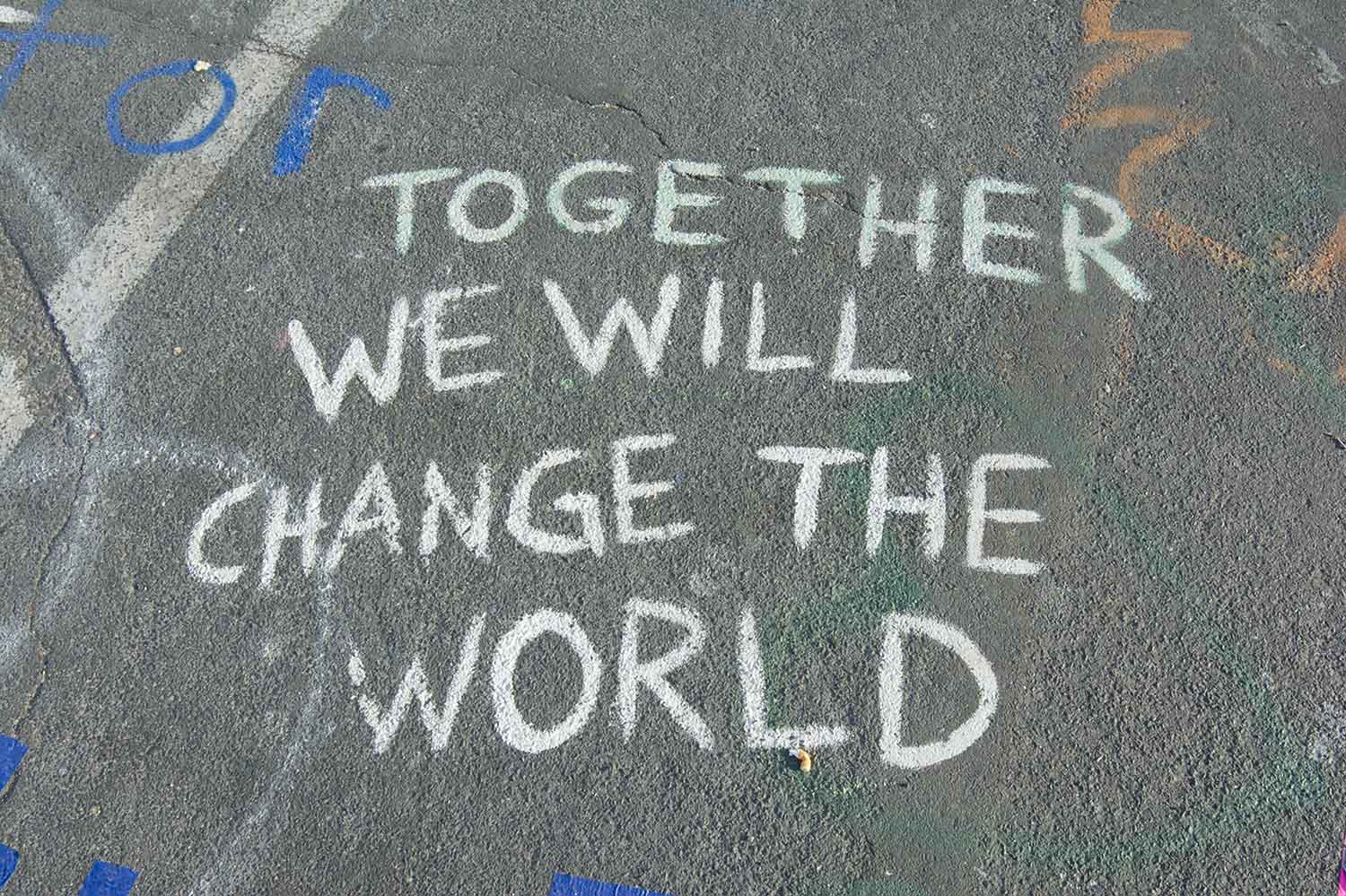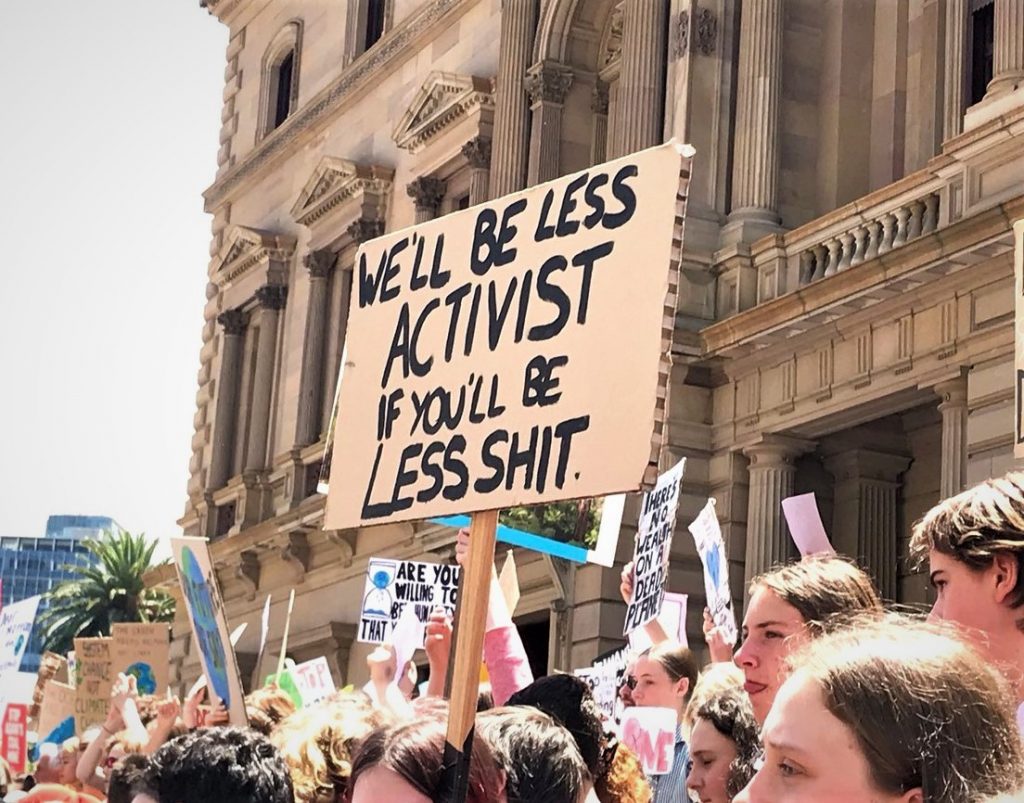What if we lived in a world where climate change was no longer an issue?
To reach the UN’s goal of cutting carbon emissions to net-zero by 2050 means we only have the next ten years to cut down at least 45% of global carbon emissions. I’m here to tell you that we can reach that goal! We need to demand institutions to divest our money from fossil fuels.
What are some of the challenges we face? One: Leadership positions that fail to promote climate action. Two: A mentality that undervalues small actions.
Many of us fear that to advocate for the planet means to be 100% sustainable. It’s very likely you have gone through these doubts. This is because of plastic items you may still be using, or because your carbon footprint is not net-zero.

To think this way is unproductive.
Altogether, it’s better if everyone stops using one plastic item than one person being 100% perfect. I still travel by plane aware that transportation is a leading contributor to carbon emissions.
That doesn’t mean I can’t be an advocate for Earth
So, why is it difficult for us to live completely sustainable?
It’s because we live in a fossil fuel-dependent system that doesn’t allow us to reduce our personal emissions to net-zero.
Companies invest the money we give them to the fossil fuel industry. If fossil fuels fail, we lose money. If they profit, our planet boils. So, how can we break this dependent relationship? One word: divestment. That means demanding our institutions and local governments to stop investing in fossil fuels, and start investing in sustainable energy.
As a matter of fact, 100 companies in the world are responsible for 71% of carbon emissions. These small groups of individuals are the ones responsible for destroying the planet.
Are you angry already? If you are, use your voice because it will change everything!
If everyone takes small actions, this will turn into a global effort. We are all part of the same team.
How To Make Systemic Change Through Small Actions?
First step: Change your mentality.
We need to stop looking at ourselves as consumers but as citizens. As consumers, our plastic switches make a difference. Unfortunately, these are short-term, harm reduction strategies. Temperatures are still rising at alarming rates.
That is why we need to think like citizens. Acting like a citizen assures that you’re thinking of collective and systemic change. Individual action + collective action is a powerful combination to inspire the world.
In local terms, those changes are in your banks, medical institutions, universities, and city counsels.
Second step: Challenge yourself to send a letter every Monday to ask institutions to divest.
Ella Lagé, a climate activist from Berlin, sent one letter to her pension fund, and they agreed to divest a percentage from fossil fuel companies. When she told the media, her story inspired others from the same pension fund to write a letter. Imagine if everyone did this to the corporations investing our money.

Why Should I Do This?
“I’m not a scientist, and I’m not a climate change expert. So, what gives me the right to be an activist?”
You’re a citizen of this planet, and climate issues affect you every day. You ought to be concerned enough to speak out on issues happening in your home.
You have a right to live in a plastic-free land with clean water and air, and risk-free from natural disasters provoked by climate change.
Governments should be held accountable for what communities are suffering and what we will suffer in the future. A culture of silence is no longer welcomed.
Look inwards: What’s your relationship with nature? How are you coexisting with the elemental forces that give you life? Why are you separating yourself from the environment when you are the environment?
I’m the first generation of Gen-Z adults living in Mexico City.
Here the sun seldom visits us. When we crave the light, smog is there to decorate the sky. I’m only 20 years old, and climate change is my present and most likely future.
We owe our voice to future generations.
If you have the privilege to speak up, you must do so. The system undervalues the power of your voice for a good reason. If you don’t believe that your actions transcend into a global effort, our current system wins.
Humanity’s greatest strength is compassion. Let’s use that!
Speak Up: Ask Institutions To Divest From Fossil Fuels
Google to find your city’s senator of finances, contact your bank, local college, religious institutions, and other organizations. Send them an email to let them know your silence is over. Tell someone you did and why.
Click for email templates to your school, pension fund, church, or let these guide you to write your own. It’s time to invest in the sustainable energy industry. Here is a break-up letter to your bank, or if you’re unable to break-up use this example, and here is a list of global banks investing in fossil fuels.
Copy, paste, change a few words depending on your country, and press send. Reach out and tell them to divest. If we get rid of fossil fuels, new plastics will be out of the way.
And, if you want to write your own letter to make it even more personal, use these tips from APA to send emails to your government.
It takes one person, one voice. If you and I do this, we will turn it into a global movement.
Do what you can to reduce plastic in your life, reduce your carbon emissions, and don’t be afraid to raise your voice against injustices. For now, all I can hope is that our global efforts will bring back those pure blue skies that have been missing for a long time.


